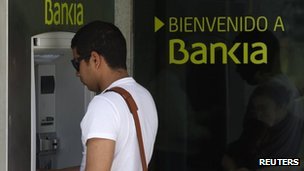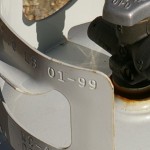From BBC News | On May 17th, 2012

Ratings agency Moody’s has cut the credit ratings of 16 Spanish banks, a further blow to a country that is struggling to deal with the bad debts of its banking sector.
It also cut the debt rating on Santander UK, a subsidiary of the Spanish banking giant.
It comes after shares in struggling lender Bankia fell another 14%. They have almost halved in value this month.
Fears about losses at Spanish banks has hit shares across Europe.
The banks include Banco Santander and BBVA, the biggest banks in Spain. Ten of the 17 banks were also put on negative credit watch, meaning that further downgrades are possible.
“The change to Moody’s credit rating of Santander UK plc has no impact on our businesses in the UK or our plans for future growth,” Andy Smith, a spokesman at Santander said about the downgrade.
“Santander UK plc is an autonomous subsidiary of the Santander Group, with more than 90% of its total assets held in the UK and a eurozone sovereign exposure of less than 1% of assets.”
In cutting the ratings, Moody’s cited the “adverse operating conditions, characterised by the renewed recession, the ongoing real-estate crisis and persistent high levels of unemployment”.
It also said that the Spanish government, due to its borrowing difficulties, has had its ability to provide support to the banks “reduced”.
The Spanish government also had to pay higher rates of interest to borrow money on the markets, which leads some to believe it will need a bailout.
Moody’s also cut the ratings of four of Spain’s regions – Catalonia, Murcia, Andalucia and Extremadura – of whom it said there is only a “low probability that the regional governments will be able to meet the 2012 deficit target”.
‘Basically normal’
Bankia was forced to deny a report customers had taken 1bn euros ($1.3bn; £800m) out of the bank, which is set to be part-nationalised, in the past week.
Spain’s economy minister denied reports of a surge in withdrawals from Bankia in recent days.
“It’s not true that there is an exit of deposits at this moment from Bankia,” said Fernando Jimenez Latorre.
Later, the bank’s chief executive said volumes had been “basically normal”.
Bankia, which holds 32bn euros (£25.7bn) in distressed property assets, was partly nationalised this month. On Wednesday, it said it was delaying the release of its first-quarter results.
It has the industry’s largest exposure to the property market, which burst spectacularly and has saddled its banks with bad debt.
“Markets are worried about eurozone bank deposit runs and an escalating banking crisis,” said VTB Capital economist Neil MacKinnon.
Alberto Gallo, head of credit research at Royal Bank of Scotland, told the BBC: “The problem is Spanish banks are too large for the government to bear all of their weight.
“You [the Spanish government] need to make a choice and just protect stronger banks, otherwise Spain will go the way of Ireland – having to do a lot of austerity and potentially incurring losses for bank bondholders.”
Earlier, the Spanish government raised 2.5bn euros through issuing a number of different types of bonds.
On bonds due to be paid back in January 2015, it had to pay an interest rate of 4.373%, up from 2.89% in April. Governments have to pay higher returns to investors, or yields, as lenders become more concerned about a country’s ability to pay the money back.
On Wednesday, Spain’s Prime Minister Mariano Rajoy warned that borrowing costs could become “astronomical” as fears about the weakness of its banks persist.
—
This article was originally posted at http://www.bbc.co.uk/news/business-18100049







